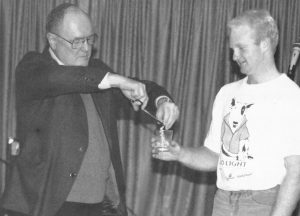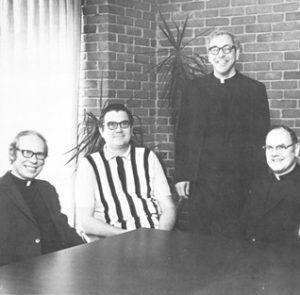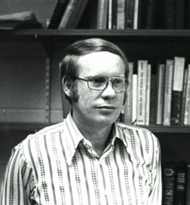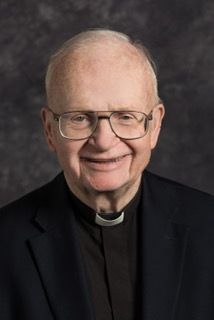By Dr. Raymond G. Hebert
Thomas More University
Part 70 of our series, “Retrospect and Vista II”: Thomas More College/University, 1971-2021
In his thesis entitled, “The History and Status of Villa Madonna College 1921-1961,” Thomas Hanna pointed out the significance of Theology’s place in the college’s thinking after 1961. In his words, “The Theology Department was the Department of Religious Education until 1961,” adding that at this crucial transition point there would be new objectives and also a new name (Theology):
1. To give a broad look at the content of the faith
2. To give a scientific and rational basis for it
3. To organize the beliefs into a unified system and
4. To integrate religious intellectual knowledge with daily practical life.” (Hanna, 1962, p. 260)

Fr. Richard McGrath. (TMU Archives)
It seems that the last of these was of particular importance as the institution looked to move more directly into its expanded role as a liberal arts institution in the Catholic intellectual tradition. What seemed relevant is a change in thinking that had begun in the 1950s. As a Catholic, diocesan institution, theology (religion) courses were always required for graduation from Villa Madonna College—first for all Catholic students, and in time, with an expansion of offerings, for all students. As found in the college archives, and from the chair of the Theology Department Fr. Richard McGrath, in the early 1960s “the theology requirements varied from two semester hours for each year of residence required from 1921 through the early 1930’s to 8 hours (same result) from the middle 1930’s to the early 1940’s, to 10 hours by 1950.” In 1952 “the requirement was again increased to two semester hours for each semester of residency up to eight semesters (for a total of 16 hours of theology): for the Catholic student who completes all of the undergraduate work at the College” (Hanna, p. 260).
Meanwhile, at that point, it appears that non-Catholic students were only required to take two courses in “non-denominational” religion instead of the theology requirement. This was later changed to six credit hours in 1957, but broadened to include approved substitute courses in fields such as philosophy, sociology, or psychology. It was noted in the Theology archives that those students were always welcome in Theology courses and that many non-Catholics were among the registrants (Theology files, TMU Archives).
The Theology courses were “traditionally” taught by diocesan priests assigned to the college by the bishop. Initially, just being a priest was enough of a qualification, but Hanna noted that in the 1960s “only priests possessing a Licentiate (STL) in Sacred Theology (equal to a Master’s Degree) or a Doctorate (STD- Doctorate in Sacred Theology) could be assigned those courses” (Hanna, p. 261).

Fr. McGrath performing a magic trick. (TMU Archives)
The first group of faculty in this newly strengthened Theology Department included Rev. John H. Ramsey, who in 1955 had been designated as the first chair of the Religious Education department before being replaced by Rev. Richard McGrath in 1961. Other priests in the department during the transitional year of 1961–1962 were the Reverends Donald Moeller, James Quill, Eugene Wolfzorn, John Wordeman and Lawrence Keller (TMU Archives; Hanna, pp. 261-262).
Fr. McGrath took the lead in the college’s final downtown years as Villa Madonna (1960s). He remained chair for the first decades on the Crestview Hills campus, where the Theology program played an even more important role in the education for all students than it had previously.
Fr. McGrath, who earned his STL at Catholic University and his STD from Angelicum University in Rome, would ultimately anchor the department for 45 years (many as chair) before being granted Emeritus status in 1998. During his decades of teaching, he remained active with publications in the Catholic Biblical Quarterly, the Saint Anthony Messenger, and the Covington diocese’s Messenger. He routinely gave talks at other institutions (such as NKU’s Newman Center and at the University of Cincinnati), was a regular panelist at interfaith/ecumenical programs, gave Serra Club talks, and was a consistent lecturer on biblical and theological topics in churches across both Kentucky and Ohio. Not surprisingly, he was heavily sought after as a Retreat Master as well.

Frs. Brink, Wordeman, Wolfzorn and McGrath. (TMU Archives)
At Thomas More, McGrath was always appreciated by the administration for his willingness to create new offerings that would enhance the Theology Department’s curriculum. Among the most popular, for many years, was a course called “Death: A Fact of Life” in which he addressed the complicated issues surrounding the theology of death. It was noted in some of his evaluations in the 1980s that this was a course “every student should take before they graduate” (Theology evaluation files, TMU Archives).
Reflecting on his success as an excellent faculty member, one of his later chairs said of him: “Father McGrath engages in numerous scholarly and professional activities of high-level time input and quality work. . . . Father’s revamping and development of new courses bespeak of his keeping up with the field and following of new insights” (Rev. Richard McGrath Evaluation Files, 1982-1984, TMU Archives).
It was also noted, in multiple issues of the Triskele and Moreover, that Fr. McGrath was always supportive of students and had an “excellent sense of humor.” He would at times even join the Villa Players on stage in one of their productions. He would also perform magic tricks, one of his avocations. Even as late as 1994 in a nomination for the “Outstanding Teacher of the Year,” when he was a finalist, one of his peers praised him for his “commitment and understanding; his unique way of sharing knowledge; his discriminating ways; his never being too busy to talk with or help one out [and] his dedication to his craft as a ‘true calling.’ ” (Theology Department Evaluation files, TMU Archives). This was a significant document because earlier—in 1978—Fr. McGrath had been named Outstanding Full-Time Faculty Member of the Year.

Fr. Brink in the 1970s. (TMU Archives)
In addition to Fr. McGrath, another longstanding faculty member in the Theology department—from his arrival in 1967 into the 1980s—was Rev. Joseph C. Brink. Fr. Joe’s contributions were different, however, because of the nature of his interests and his pursuit of and success with leadership positions. With a background of having taught at Newport Catholic High School and served as Associate Director at the Marydale Retreat House and Camp, he arrived on the Crestview Hills campus of Thomas More College with teaching as his goal. As he could, he pursued graduate work at Xavier University, the University of Notre Dame, and Fordham University, after his seminary work at St. Paul in Minnesota and St. Pius X locally. Sadly, though, he never completed his PhD at Fordham, for a series of complicated reasons beyond his control.
As a member of the Theology department, in the 1970s and early 1980s, Brink’s contributions were many and his work stellar. His work with Student Affairs in the early 1970s led to his election as Chair of the Faculty General Assembly (by the faculty) in 1974–1975, a position he held for a number of years. With it came a position on the college’s Board of Trustees, as well as chairing both the Faculty Coordinating Committee and the Academic Affairs Committee. Simultaneously, he served on the Board’s Finance Committee, and in 1978 became the Head of the Southern Association Self Study Process at the request of President Robert Giroux. This latter position reflected the enormous respect he had built up through the 1970s, both internally and with the Southern Association Accreditation Leadership and Liaisons because of his many years of serving on multiple Visitation Committees (some 15-20 in all) over a decade or more (Theology files, including correspondence with President Robert Giroux and various SACS leadership officials, TMU Archives). Buoyed by this success and with the encouragement of President Giroux, who was moving to Kansas Newman College in Wichita, Kansas, Fr. Brink was given the title of Provost by the Board of Trustees and asked to serve as the equivalent of interim president.

Fr. Ronald Ketteler. (TMU Archives)
It is noteworthy in his pursuit of the presidency for himself that followed in 1981–1982, Brink emphasized among his strengths both his previous experiences, including the year as Provost, but also his talents both as a faculty member and as a public speaker, an area at which he had indeed excelled, particularly among the clergy. In his words, within his application packet, he emphasized how the “job of a president, in great part is being a good speaker and a graceful person in public … {the president] must possess the ability to speak well and lucidly.” He added, “I have spoken before almost every kind of group from TV and radio to priest groups, to sisters, to civic organizations [and] I believe I possess the social graces the job of president requires” (Rev. Joseph Brink Theology File, TMU Archives).
As noted earlier, in a decade when the Southern Association and other national accrediting organizations were putting an additional emphasis on the required credentials particularly for teaching faculty, Fr. Brink’s lack of a terminal degree was — unfortunately for him — called into question by the Presidential Search Committee. The committee, of course, appropriately praised him for his contributions to Thomas More over the years and especially in his interim years as Provost, but ultimately he was not accepted as one of the finalists for the hire that would bring Dr. Thomas Coffey to Thomas More as the new president. This was seen as a rejection by Fr. Brink, who soon after shifted his goals from the academic world to the pastoral one. His remaining years were of ministry, including serving as Pastor both at Holy Cross Church in Covington and at St. Mary’s in Alexandria. While in residence at Blessed Sacrament Church in Ft. Mitchell, he served as president of the National Federation of Priests’ Councils before returning in 2004 to his residence at St. Pius X Rectory in Edgewood and, finally, to Carmel Manor in Fort Thomas (Rev. Joseph Charles Brink Obituary, Cincinnati.com).
The next generation of faculty in the Theology department included a Brown County Ursuline sister named Sister Jane Stier, and a layman, Stephen “Steve” Holler. The next up-and-coming “legend” was Rev. Ronald Ketteler. After early assignments in the Covington area and some teaching at both Covington Latin School and St. Pius X Seminary, Ketteler was named the first associate chaplain at the first “campus parish” in the United States, at the University of Kentucky. “[Later] he became the first full time chaplain at Eastern Kentucky University in Richmond, KY. During his ministry there he oversaw the establishment of a “campus parish” at St. Stephen the Martyr Church, and established the University’s first ever Newman Club” (Laura Keener, The Messenger, September 9, 2022, p.3). In 1982 Fr. Ketteler was appointed to teach theology and philosophy at Thomas More College, and was soon named the chair of the Theology department.
During his four decades at Thomas More Fr. Ketteler branched out and fulfilled many other roles. In the mid-1980s he was named as consultant to the Catholic Conference of Kentucky (CCK), a public advocacy group set up by Kentucky’s four bishops/archbishops. “In that role he drafted many pastoral letters and statements for the bishops.” He frequently testified in Frankfort on their behalf over the years. He also became the chair of three CCK committees on “ecumenism, health care, and pro-life issues.” Within the Diocese, he was appointed (1998) the episcopal liaison to the Diocesan newspaper, The Messenger, and in that capacity served three bishops and three editors. Most significantly, from the 1980s until his death, he wrote columns and articles for The Messenger, which in the 1990s became two columns a month, “with his last column being published, July 29, 2022, just a few weeks before his death” (Laura Keener, The Messenger, September 9, 2022).
Ketteler is remembered as a brilliant theologian, voracious reader, and devoted priest. He also served as Director of Ecumenism for the Diocese of Covington for many years and as a board member for the Kentucky Council of Churches on behalf of the Diocese of Covington.

Prof. Caitlin Dwyer and Fr. Ray Enzweiler. (TMU Archives)
Reflecting on Ketteler’s four decades as a major figure in the Thomas More Department of Theology, culminating in 2021 with his designation as the university’s first “Theologian in Residence,” Thomas More President Joseph Chillo summarized it best when he stated: “For 40 years, Msgr. Ketteler had a profound impact on Catholic Education as a faulty member and most recently as the Theologian in Residence at Thomas More University. His dedication to our university and the Theology Department ensured that every student had a thorough understanding of the values of our mission and our responsibility to others. Since his death, numerous alumni have shared stories of Msgr. Ketteler and how he married many of them and even baptized their children. His impact reached far outside of the classroom and his care and dedication to students will be sorely missed” (Keener, Messenger, p. 3).
Clearly, Monsignor Ketteler continued the tradition of many dedicated diocesan priests, including Fr. Richard McGrath, Fr. Joseph Brink and others, who had preceded him as pillars of the department. In each case, these talented diocesan priests brought unique and colorful personalities to the curriculum of the department.
During Ketteler’s final decade, he was supported by the addition of Sr. M. Fidelis Tracy, CDP, a scripture scholar who was much beloved by the students and who retired herself one year before Msgr. Ketteler. She was the recipient of the Outstanding Part-time Faculty Member of the Year Award in 2020.
During Msgr. Ketteler’s final year, Fr. Raymond Enzweiler joined Thomas More University as the new Chair of Theology after serving in a leadership role as the Vice Rector at the Pontifical College Josephinum in Columbus, Ohio. Enzweiler joined Ms. Caitlin Dwyer, whom Ketteler hired in 2017. Dwyer has the distinction of being the first lay woman to serve as a full-time faculty member in Theology at Thomas More. The department is currently working to integrate theology into a newly designed core curriculum and to adapt the department’s programs to meet the changing needs of the Church in the modern era. The department has been, and continues, to be central to the mission of Thomas More University as the Diocese of Covington’s Catholic university.
Dr. Raymond G. Hebert is a Professor of History and Executive Director of the William T. Robinson III Institute for Religious Liberty at Thomas More University. He has just completed his 46th year at Thomas More and, with that background, will now serve as the General Editor of the official history of Thomas More College/University from 1971-2021. With a projected title of RETROSPECT AND VISTA II, it will serve as the sequel to Sr. Irmina Saelinger’s RETROSPECT AND VISTA, the history of the first 50 years of Thomas More College (formerly Villa Madonna College). He can be contacted at hebertr@thomasmore.edu.
We want to learn more about the history of your business, church, school, or organization in our region (Cincinnati, Northern Kentucky, and along the Ohio River). If you would like to share your rich history with others, please contact the editor of “Our Rich History,” Paul A. Tenkotte, at tenkottep@nku.edu. Paul A. Tenkotte, PhD is Professor of History and Gender Studies at Northern Kentucky University (NKU) and the author of many books and articles.
























